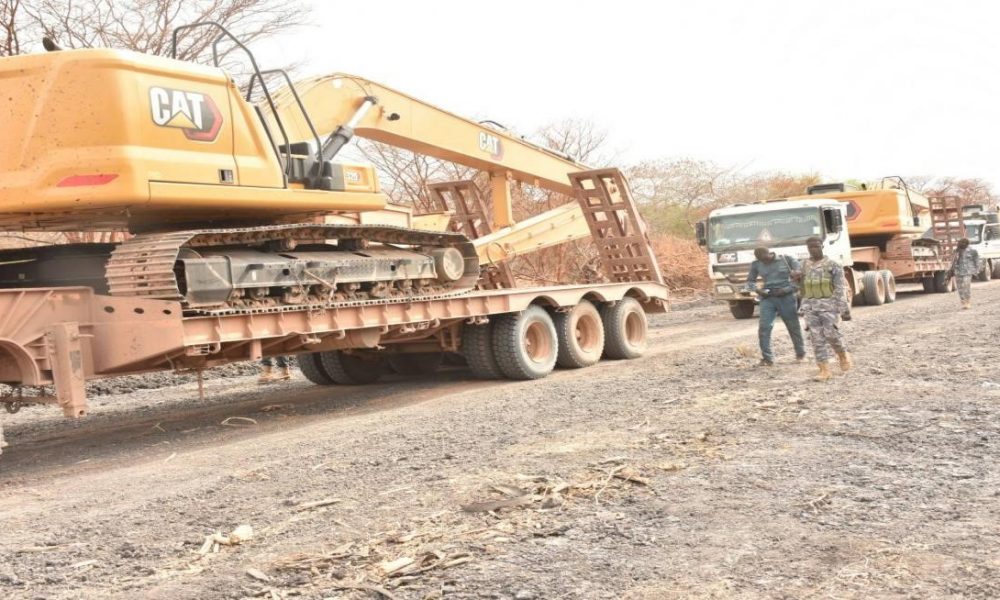By Emelda Siama John Lopula
The Governor of Unity state, Joseph Manytuil Wejang has received four excavator machines from Juba for clearing and cleaning of Naam River at the Kai-kang area of Mayom County.
Speaking to the press secretary in the office of the governor, Mr. Peter Bakueny confirmed receipt of the machines to No.1 Citizen Daily Newspaper yesterday via phone from Bentiu.
He said Governor Manytuil received four excavator machines on Wednesday for clearing Naam River at the Kai-kang areas.
“These are the machines that we are waiting for, the ones we have here were brought from Khartoum last year they can move on water but they don’t have excavators, so the four excavator machines will monitor the previous machines so that they can start the work after two to three days,” Bakunyi said.
He stated that the commencement of clearing and cleaning work on the Naam River will start with its first phase from Bentiu to Lake No, and the second phase from Bentiu to Bahr el Ghazal region.
“The process of cleaning the river will take a long duration due to the step one and step two, step one will start from Bentiu up to Lake No, and then step two will stated from Bentiu up to Bahr el Ghazal region,” he noted,
Peter however noted that it cannot be determine for how long the exercise is going to take.
“The communities are very happy because this is the best way the flood is going to reduce, and it will help also in river transport after the clearing of rivers,” he cited.
He revealed that the governor of Unity State wants to make sure that people go back to the areas to cultivate, unfortunately they cannot go until the flood reduces.
“We open up the rivers due to inaccessibility of other areas like Panyijar, the state Government can (be) able to transport food through river up to the areas meanwhile people can move freely from northern part up to southern part after the clearing. And the People of Unity state are happy because they have been yarning for the cleaning of the river for the past two years,” he noted.
Meanwhile, speaking upon reception of the excavators at the Kai-kang- Rotriak highway, governor Joseph Manytuil described the arrival of the four excavators from Juba as a major breakthrough to start the clearing of the rivers.
“The state and national government are determined to save our people from the natural disasters and fully optimistic that with the clearance of our rivers, it’s going to reduce and mitigate the flood drastically,” he said.
Manytuil stated that his administration will launch the clearing of Nam River after three days from Yoahnyang River to Lake No as the first phase and from Yoahnyang (Bentiu) to Bahr el Ghazal as second phase.
Environmental impact assessment
Meanwhile, President Salva Kiir Mayardit in late March this year okayed the conduct of the feasibility studies for environmental social impact assessments on the Naam River prior to the cleaning.
“I am directing the Ministry of Finance and Planning to avail fund for the conduct of feasibility studies for environmental social impact assessment on the Naam River and for building resilience of flood affected communities,” Kiir directed in his inaugural speech at the resumption of assembly sitting last month.
The president’s directives mean the proposed dredging or cleaning of River Nile tributaries by Ministry of Water Resources and Irrigation will be on hold, until Josephine Napwon’s docket (Ministry of Environment and Forestry) completes scientific research before giving green light.
However, the environmental impact, social assessment is yet to be actualized though governor Manytuil is now talking of commencing the clearing exercise in few days to come.
On February, 2023, President Salva Kiir led the vice presidents in discussion on “cleaning” the White Nile and Naam river months after their suspension, which divided opinions, with ecologists fearing that the exercise could impact the ecology of the Sudd wetlands.
Whether to dredge the Naam River or not to dredge has been putting environmentalists and supporters of such initiatives on a collision path.
The Ministry of Water Resources and Irrigation had proposed a project to dredge rivers and possibly resume digging of the Jonglei Canal. But this development has no doubt elicited mixed reactions from various stakeholders.
The Minister for Environment and Forestry, Josephine Napwon, disowned the project saying it must not commence until proper assessment had been made of the dire consequences and possible benefits of such a project.
She noted that the project was designed to address the impacts of floods which had displaced over 800,000 people.
The minister added that her ministry was yet to be notified about the project, adding that it required extensive research before its commencement.
Prof. John Akec, the Vice-Chancellor of the University of Juba has been one of the fierce critics of the dredging of Nile tributaries, saying that is not a scientific solution to the flooding menace that is witnessed from time to time.
Those in support of the dredging said it will ease transportation along the water bodies and reduce flooding as well.
The other concern of those opposing the dredging, was an alleged secret agreement the government made with Egypt to allow it carry out the exercise along the rivers.
Egypt which depends on the waters of the Nile for most of its industrial, agricultural, and domestic uses, has a vested interest in the management of the Nile waters.




